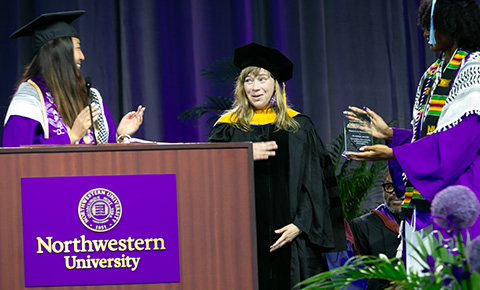Haase Wins Ver Steeg Fellowship

Claudia Haase, a developmental psychologist at Northwestern University’s School of Education and Social Policy, received the 19th annual Dorothy Ann and Clarence L. Ver Steeg Distinguished Research Fellowship Award for her work probing the mysteries behind emotions and relationships.
Haase, associate professor of human development and social policy, is faculty director of the Life-Span Development Laboratory at Northwestern and co-director of the newly formed Chicago Consortium on Longevity. Her work examines pathways toward healthy development across the life span, and focuses on emotions in individuals, couples, parent-child relationships and friendships.
The Ver Steeg Fellowship supports the research of a tenured Northwestern faculty member whose work enhances the reputation of Northwestern nationally and internationally and comes with a one-time research grant of $45,000.
A core faculty member in Northwestern’s Center for Culture, Brain, Biology, and Learning, Haase shares the award with art historian Rebecca Zorach of Weinberg College of Arts and Sciences, who was also named a 2024 winner.
Haase, the third School of Education and Social Policy faculty member to win the Ver Steeg research award, joins Cynthia Coburn (2020), professor of education and social policy; and James Spillane (2013) Spencer T. and Ann W. Olin Professor in Learning and Organizational Change.
“Emotions can move us, connect us, and drive human development,” Haase said. “The Ver Steeg Fellowship will allow me — together with my wonderful mentees and collaborators at Northwestern and across the globe — to make some long-held research dreams come true. As mysterious and as complex as human emotions are, there is science that can be done here. And we are just getting started.”
Originally from Dresden, (former East) Germany, Haase has long puzzled over what is now a central question of her research: Why do some people feel hope and high spirits in the face of adversity while others spiral in despair?
By studying emotions as they are happening and looking at facial expressions, physiological signals, language, and other cues, she has broken new ground in the burgeoning field of affective science, where she is renowned for her work examining the relationship between emotions and marriage, health, aging, mental illness, social connection, and more.
She is particularly interested in real-time interactions between two people—as they talk about a conflict in their relationship, things they enjoy doing together, or simply how their day went—to understand how emotions can transform relationships.
"Claudia's work is especially compelling because it helps us see what we might learn from close, structured interactions between couples over long periods of time,” said School of Education and Social Policy Dean Bryan Brayboy.
'Emotions don't happen in a vacuum'
Part of a new generation of broadly trained multidisciplinary scientists, Haase is fluent in several languages (German, English, and French, with some memories of Russian and Italian) and fosters social connection within and across countries through her research, teaching, mentoring, and national and international outreach.
She recently supported grassroot activities in Ukraine by hosting a Buffett Virtual Visitor from Ukraine, organizing conversations with Ukrainian scientists about psychological vulnerabilities and resources for democracy, and connecting people in Ukraine with psychotherapy resources in the face of war and trauma.
While most existing research on emotions examines individuals, Haase has long recognized that relationships are hotbeds of emotion. “Emotions don’t happen in a vacuum,” Haase said, “we feel them most strongly in relationship with others – with people close to us and, sometimes, with people far away from us.”
In that spirit, she has recently been looking at emotions and relationships through the lens of socioeconomic inequality and cross-cultural comparisons.
Some of her findings point towards universal patterns. One study linked a genetic variant to positive emotional expressions, such as smiling and laughing, suggesting that emotional reactivity may partly lie in a person’s DNA.
Another connected emotion to physical health after the researchers found that angry outbursts are tied to heart problems. Conversely people who stonewall—or shut down during conflict—had an increased risk of developing back aches or muscle tension, according to the research in Emotion.
More recent work has shown that people who can generate more joy or happiness are buffered from memory decline that happens with aging.
In the last two years, she has published more than 20 articles in leading peer-reviewed journals and five book chapters with her students and collaborators. In addition, she is a co-investigator on a National Institute on Aging grant to examine “Emotion, Aging, and Decision-Making.”
In 2023, she was one of the key organizers of Connections, a PhD preparation and community-building program for those often marginalized in higher education. The program was supported by a Daniel Linzer Grant for Diversity and Equity.
Haase is a faculty affiliate at Northwestern’s Institute for Policy Research, the Institute for Innovations in Developmental Sciences, and the Buffett Institute for Global Affairs. She is a faculty member at the Northwestern University Interdepartmental Neuroscience program.
Awards include a NARSAD Young Investigator Grant from the Brain and Behavior Research Foundation and a Fletcher Prize for Excellence in Research Mentorship. She is an associate editor for the journals Affective Science and Cognition and Emotion and past associate editor for Emotion.
In addition to the Ver Steeg Fellowship, Haase also won the 2024 Outstanding Professor Award in part for her popular classes Adulthood and Aging and Emotional Mysteries.
“In class, she validated the struggles of early adulthood when I needed it most,” one nominator wrote. “She clearly is passionate about her work, is highly knowledgeable about people and relationships, and is simply a good human being.”